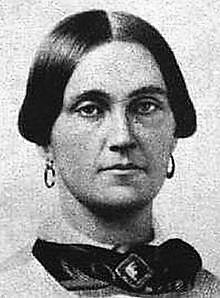
Previously in the novel: War Secretary Stanton holds the Lincolns captive under guard in the White House basement. Stanton selects Duff, an AWOL convict,to impersonate Lincoln. Duff learns how to conduct cabinet meetings. Stanton brings news of Gettysburg to the basement. Janitor Gabby’s uncle Sammy was killed.
Her large, watery blue eyes followed the flight of stairs, so far up, so steep, so forbidding. A deep sigh made its way through Cordie’s pale, wrinkled lips. Too many dying boys, too much moaning, she fretted, as she took her first step to ascend the boardinghouse stairs. The day was not over yet, because Cordie had agreed to join Jessie and Adam at the candlelight parade.
Finally reaching the top floor, Cordie breathed deeply before opening her bedroom door. And those trousers, she thought to herself, they had to be mended. Adam brought her a pair from Gabby, and they had to be fixed so he would have something proper to wear. In the room, the bed beckoned to her, but Cordie resisted; her duty to Gabby came first, so she sat, turned on her kerosene lamp, and proceeded to stitch the crotch of her brother’s worn blue pants.
Downstairs the front door opened, and Cordie heard Mrs. Surratt’s strident voice pierce the silence. After a few harsh words with Mrs. Edwards, the landlady stomped up the stairs. Cordie steeled herself as the steps neared her door.
“I’m here for the rent. It’s past due.” Mrs. Surratt swung open the door after sharply knocking once. She stopped and glared at the trousers on Cordie’s lap. “Those pants. Who do they belong to?”
“Gabby.”
“Gabby? Who’s Gabby?”
“My brother. He lives with me.”
“He lives here?” Mrs. Surratt went to the armoire to open it to see a rack of men’s rough shirts, a jacket, and another pair of slacks. “You mean he’s been living here all this time, and you haven’t paid his rent?”
“He hasn’t been sleeping here for almost a year.”
“Well, does he live here or not?”
“I guess not. But I always think of him and me living together. We help each other get by.”
“Then where is he living?”
“I—I don’t think I’m allowed to say.” Her eyes fluttered.
“When it comes to cheating me out of rent money you have to tell.”
“As long as it doesn’t go any further…”
“Get on with it.”
“The White House,” she whispered. “He—he’s the janitor.”
“Those Republicans make him work day and night?”
“Yes.” Cordie’s eyes went down.
“Those Republicans make everyone’s life miserable.” Mrs. Surratt’s face softened as she sat on the edge of the bed by Cordie’s chair. “Where are you from, dear?”
“New York City.”
“Ah, the gallant Irish. You know, they’re rioting this very moment against the infamous draft.” She smiled. “Were your parents from Ireland?”
“No,” Cordie replied. “They were born here. My parents never talked about where their folks were from.” She looked at Mrs. Surratt with curiosity. “Is Zook an Irish name?”
“I really don’t know what kind of name Zook is. It could be Irish.”
“Why do you care if I was Irish or not?” Cordie did not know why Mrs. Surratt’s questions irritated her. Perhaps it was because climbing all those stairs wore her out.
“Oh, I don’t care, really. It’s just I like the Irish, that’s all.”
“Why?” Cordie told herself not be so impatient with the woman. After all, she was making an attempt to be friendly.
“I suppose it’s their religion,” Mrs. Surratt replied in a flat tone.
“We weren’t much of anything particular.”
“Oh. We in Maryland follow the true faith, Roman Catholic. As do the Irish. The Irish in New York don’t want to be forced to fight against the South. The Pope sees this as a holy war against the Roman Catholic Church. The Northerners have no respect for the Pope.”
“Papa was a lawyer. He defended all kinds of poor people, Irish Catholics, German Jews, Gypsies. He even defended a man who didn’t believe in God at all.”
“But your father did believe in God?”
“Yes.”
“You’re confusing me. What side are you on?”
“We’re for the Union. Papa said slavery was wrong.”
“Oh.”
“My uncle, Samuel Zook, is a Union general.”
“You know, my dear, this war isn’t about slavery, but states’ rights.”
“Papa said states don’t have rights; people have rights.”
“As I was saying, this war’s about freedom, about the right to worship as you please.”
“Catholics get to go to church like anybody else,” Cordie firmly said.
“It’s obvious you’ve led a sheltered life. Religious intolerance surrounds us. You’ve only to open your eyes to see it.” She looked away, noticing the half-finished Gabby quilt on the bed. “What’s this?”
“A Gabby quilt. I used to make pretty ones, wedding ring, starbursts…”
“I loved to make starburst quilts. They sold well at the inn.”
“Good quilts sell for good money. These old things don’t go for much. The boys living here buy them. They don’t know better.”
“When my husband died, I didn’t have time to make quilts anymore.”
“Old age caught up with me. Then I started making these out of any old material I had around. These swatches are the last of Mama’s dresses. Then you sew old socks into the squares and sew the squares together in no particular pattern. I call them Gabby quilts because Gabby likes them.”